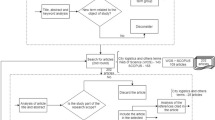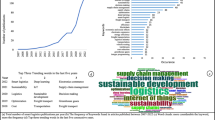Abstract
Epistemology is about acquiring knowledge and understanding. Building on the concept of epistemology, described and elaborated on, the focus of this paper is on philosophical reflection on the methodological underpinnings of logistics. A conceptual framework is outlined to analyze methodological assumptions underlying a scientific inquiry. Use of the framework is demonstrated by presenting and analyzing earlier works from within the area of logistics. Based on these analyses, it is concluded that logistics from an epistemological point of view is under change and in motion. Formerly, logistics was building heavily on objectivist methodological suppositions and positivist theory of knowledge was dominating. Although the positivist tradition still has a strong position in the area, it cannot be neglected that new logistics epistemologies are emerging and evolving, bringing new scientific approaches to logistics. It is argued that the new perspectives are closer to a more interpretive conception of social theory and subjectivist methodological suppositions. However, it is also argued that there are still theoretical perspectives on organizations, notably streams of complexity theories, not yet being adopted within the area of logistics. Such theories could, if adopted, change logistics organizations in the future. Neglecting to challenge the epistemology, of a discipline may result in an obsolete paradigm. The idea behind the paper is, therefore, that by challenging the underpinning meta theoretical assumptions, and by reflecting upon them, a more holistic and multidisciplinary approach to logistics improvement will be achieved.
Similar content being viewed by others
REFERENCES
Ackoff, R. L. (1981) Creating the Corporate Future, John Wiley & Sons, New York. Here after: Flood and Carson (1988).
Ansoff, H. J. (1987). The emerging paradigm of strategic behavour. Strategic Manage. J. 8, 501–515.
Argyris, C., and Schon, D. (1978) Organizational Learning, Addison-Wesley, Reading, MA.
Arlbjørn, J. S., and Halldorsson, A. (2001). Logistics knowledge creation: Reflections on content, context and processes. Int. J. Phys. Distrib. Logist. Manage. 32 (1), 22–40.
Bateson, G. (1972). Steps to an Ecology of Mind, Ballantine, New York.
Burrell, G., and Morgan, G. (1979). Sociolocical Paradigms and Organizational Analysis, Heineman Educational Books, London.
Checkland, P. B. (1989). Research systems methodology: Some future prospects. In Flood, R. L., et al. (Eds.), Systems Prospects, Plenum Press, New York, pp. 9–15.
Christopher, M. (1998) Logistics and Supply Chain Management, 2nd ed., Pearson Education, London.
Flood, R. L., and Carson, E. R. (1988). Dealing with complexity. An Introduction to the Theory and Application of Systems Science, Plenum Press, New York.
Flood, R. L., and Jackson, M. C. (1991). Creative Problem Solving. Total Systems Intervention, John Wiley & Sons, Chichester.
Fowler, J. A. (1998): Christianity is not epistemology. http://www.christinyou.net/pages/Xnotepis.html.
Francescato, D. (1992). A multidimentional perspective of organizational change. Syst. Pract. 5 (2), 129–146.
Guba, E. G. (ed.) (1990) The Paradigm Dialog, Sage, Newbury Park, CA.
Jackson, M. C. (1988). Some methodologies for community operations research. J. Operat. Res. Soc. 39, No. 8.
Jackson, M. C., and Keys, P. (1984). Towards a system of systems methodologies. J. Operat. Res. Soc. 35, 473–486.
Johannessen, S., and Solem, O. (2002). Logistics organizations: Ideologies, principles and practice. Int. J. Logist. Manage. 13 (1), 31–42.
Johannessen, S., and Solem, O. (2003) Logistikkorganisasjoner—strategi og utvikling [Logistics organizations: Strategy and development] (in press).
Kuhn, T. (1972). Scientific paradigms. In Barnes, B. (Ed.), Sociology of Science, Penguin, Harmondsworth, pp. 80–104.
Midgley, G. (1992). The sacred and profane in critical systems thinking. Syst. Pract. 5(1), 5–16.
Morgan, G. (ed.) (1983). Beyond Method: Strategies for Social Research, Sage, London.
Morgan, G. (1986). Images of Organization, Sage, Beverly Hills.
Morgan, G., and Smircich, L. (1980). The case for qualitative research. Acad. Manage. Rev. 5 (4), 491–500.
Møller, C. (1994) Logistics Concept Development. Towards a Theory for Designing Effective Systems, Ph.D. thesis, Department of Production, Aalborg University.
Näslund, D. (2000). Logistics needs qualitative research—especially action research. Int. J. Phys. Distrib. Logist. Manage. 32 (5), 321–338.
Oliga, J. G. (1988). Methodological foundation of systems methodologies. Syst. Pract. 1, 87–112.
Senge, P. M. (1990). The Fifth Discipline, Doubleday/Currency, New York.
Solem, O. (1985) Systemteori for administrasion og ledelse [Systems Theory for Administration and Leadership], Tapir, Trondheim.
Solem, O. (1992). Den faglige utvikling av MA i Norden. En metaforisk analyse [A metaphorical analysis of the methodological development of business logistics in the North]. In Storhagen, N. G. and Huge, M. (Eds.), Logistiska framsteg [Progress in Business Logistics], Studentlitteratur, Lund, pp. 25–38.
Solem, O. (1997). Revisiting the concept of logistics using different definition tools. In NOFOMA 97, Proceedings, Molde College, Molde.
Spear, R. (1993). Underneath the iceberg—challenges to the process of OR/systems from alternative practice. Syst. Pract. 6 (2), 139–153.
Stacey, R. D., Griffin, D., and Shaw, P. (2001) Complexity and Management—Fad or Radical Challenge to Systems Thinking? Routledge, London.
Tsoukas, H. (1993). The road to emancipation is through organizational development; A critical evaluation of total systems intervention. Syst. Pract. 6, 53–70.
Vafidis, D. (2002) Methodological Tendencies in Logistics Research, Empirical Evidence from 25 Finnish and Swedish Doctoral Dissertations 1994–1998, Publications of the Turku School of Economics and Business Administration, Series D1.
van Gigch, J. P. (1987). Decision Making About Decison Making: Metamodels and Metasystems, Abacusl Gordon & Breach, London.
van Gigch, J. P. (1993). Metamodeling: The epistemology of system science. Syst. Pract. 66, 251–258.
von Bertalanffy, L. (1968). General Systems Theory. Foundations. Development. Applications, Georg Braziller, New York.
Williams, M. (2001) Problems of Knowledge—A Critical Introduction to Epistemology, Oxford University Press, Oxford.
Author information
Authors and Affiliations
Rights and permissions
About this article
Cite this article
Solem, O. Epistemology and Logistics: A Critical Overview. Systemic Practice and Action Research 16, 437–454 (2003). https://doi.org/10.1023/B:SPAA.0000005490.12249.7a
Issue Date:
DOI: https://doi.org/10.1023/B:SPAA.0000005490.12249.7a




